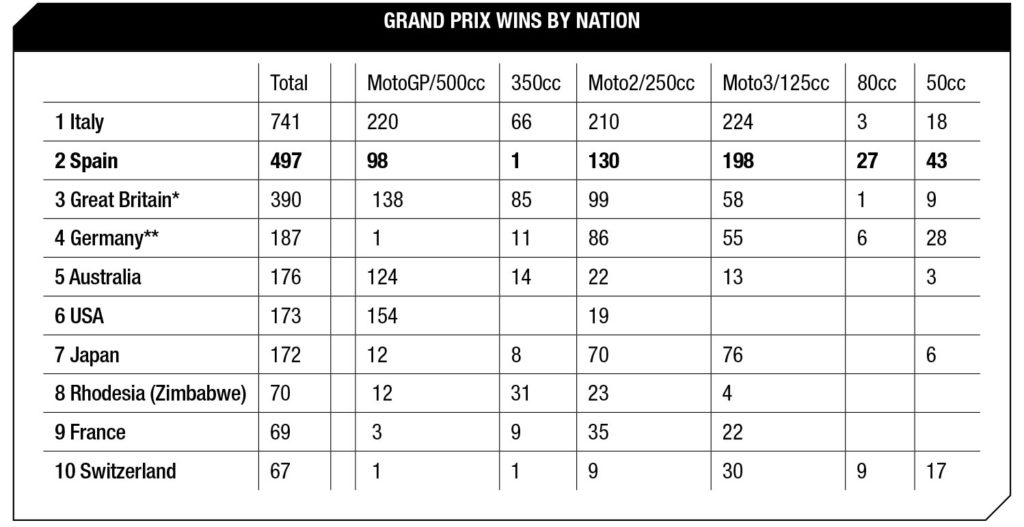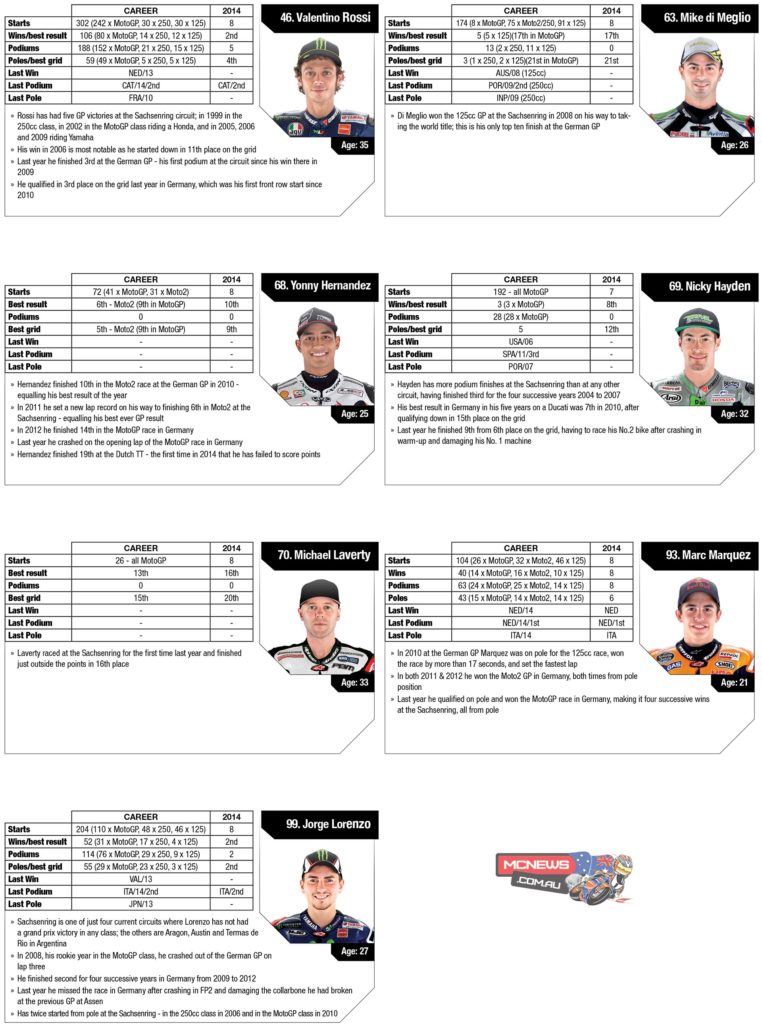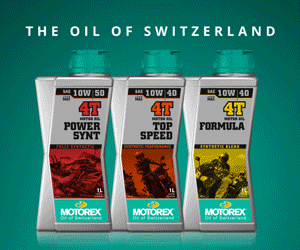2014 MotoGP World Championship – Round Nine – eni Motorrad Grand Prix Deutschland Official statistics compiled by Dr. Martin Raines
Grand Prix racing in Germany – The German Grand Prix at the Sachsenring will be the 76th Grand Prix event to be held on German soil. The following gives some facts and figures from the long history of Grand Prix racing in Germany:
- The first motorcycle Grand Prix to be held in Germany was the West German Grand Prix held at the Solitude circuit in 1952, when it was reported that 400,000 spectators turned up to watch. Ireland’s Reg Armstrong won the 350cc and 500cc races, riding Nortons. The home crowd had plenty to cheer about, with Rudi Felgenheier winning the 250cc race on a DKW and Werner Haas winning the 125cc race on a NSU
- The first East German Grand Prix was held at the Sachsenring road circuit in 1961. The original circuit used for this event was a closed road circuit, 8.73km in length
- The East German GP continued to be held at the Sachsenring each year until 1972, after which the road circuit was considered too dangerous for Grand Prix racing
- The West German Grand Prix continued to be held every year from 1952 through to 1990, when East and West joined to become a unified Germany. Four different circuits were used during this period: Solitude, Schotten, Nurburgring and Hockenheim
- There has been a German Grand Prix held every year since unification – from 1991 to 1994 at the Hockenheim circuit, followed by three years at the Nurburgring and since 1998 at the new Sachsenring
- In addition to those mentioned above, one other Grand Prix event has been held in Germany: the Baden-Wurtemberg GP, held in 1986 at the Hockenheim circuit for just the 80cc and 125cc classes
- The newly-built Sachsenring circuit was initially just 3.508km long, with one short section of track from the old road circuit. Major modifications to the circuit in 2001, and then additional slight alterations in 2003, resulted in the current 3.671 km track layout
- This will be the 17th successive year that a Grand Prix event has been held at the new Sachsenring circuit
- Since Grand Prix racing returned to the Sachsenring circuit in 1998, there have been six podium finishes by home riders: Ralf Waldmann was third in the 250cc race in 1999, Steve Jenkner was third in the 125cc race in 2002, Stefan Bradl finished 2nd in the 125cc category in 2008, Sandro Cortese finished third in the 125cc race in 2010, Stefan Bradl was second in the Moto2 race of 2011 and Sandro Cortese won the Moto3™ race in 2012
- Since the introduction of the four-stroke MotoGP class in 2002, Honda have been the most successful manufacturer at the Sachsenring with eight wins, followed by Yamaha with three and Ducati with a single victory
Marc Marquez numbers – Following the win by Marc Marquez at the Dutch TT, below is a selection of numbers relating to his current Grand Prix achievements:
- 72 – Marquez has a 72-point advantage after his Dutch TT victory; if he continues his winning sequence for the next six races, he can clinch the title at the Aragon GP – irrespective of the results of other riders
- 40 – The victory by Marquez at the Dutch TT was the 40th time that he has been on the top step of the podium in his Grand Prix career, making him the 13th most successful GP rider of all-time in terms of Grand Prix wins.
- 24 – The win at the Dutch TT was the 24th time that Marquez had stood on the podium in the MotoGP class. This is the same number of premier class podiums as the following four riders: John Surtees, Luca Cadalora, Jack Findlay and Carlos Checa.
- 21 years, 131 days – At the Dutch TT, he became the youngest rider to win eight successive premier class races, taking the record from Mike Hailwood who was 24 years and 71 days old when in 1964 he won the eighth of a 12-race winning sequence. If Marquez wins in Germany, at the age of 21 years and 146 days he will become the youngest rider to win nine successive premier class races, taking the record from Mike Hailwood who was 24 years and 86 days old when in 1964 he won the ninth of that 12-race winning sequence
- 20 – Marquez has qualified on the front row at the last 20 MotoGP races. The last time he did not start from the front row was when he was sixth on the grid in Catalunya last year
- 14 – At the Dutch TT Marquez racked up his 14th win in the MotoGP class: just one less premier class victory than 1999 500cc World Champion Alex Criville scored during his career. Criville was the first Spanish rider to win a premier class GP and also the first Spanish rider to win the premier class world title
- 8 – He is the first rider to win eight successive MotoGP races since the category was introduced in 2002 as the premier class of Grand Prix racing. The last rider to win eight or more successive premier class races was Mick Doohan in 1997, when he won ten successive 500cc GP races
- 8 – He is the first rider to win the opening eight races of the season in the premier class since Giacomo Agostini in 1971. If he wins in Germany, Marquez will become the first rider to win the opening nine races of the year since Agostini won the first ten races of the 1970 campaign
- 8 – Marquez has already taken eight wins in 2014. Only six other riders have ever won eight or more premier class GP races in a single season: Mick Doohan, Valentino Rossi, Giacomo Agostini, Casey Stoner, Jorge Lorenzo and Mike Hailwood
- 4 – Only four other riders have won eight or more successive races in the history of premier class Grand Prix racing: Giacomo Agostini, Mike Hailwood, John Surtees and Mick Doohan
11 years between wins for Anthony West – Anthony West’s win in the Moto2 race at Assen came exactly 11 years to the day after his only other GP win, in the 250cc race at the Dutch TT in 2003. This gives West the following new records with respect to time between GP wins:
- The longest time between two single World Championship Grand Prix wins. This record was previously held by Tommy Robb who, went for 10 years and 258 days between winning 350cc Finnish GP at Tampere in 1962 and the 125cc Isle of Man TT race in 1973
- The longest time between a rider’s first and second career Grand Prix wins. This record was previously held by Arthur Wheeler, who had 8 years and 32 days between his debut GP win in the 250cc class at Monza in 1954 to his second GP win, again in the 250cc class, at the Grand Prix of Argentina in 1962
With his 2014 win at the Dutch TT, West also entered the record books with the following:
- He is the first Australian rider to win a Grand Prix race in the Moto2 class.
- At the age of 32 years and 346 days, he is the eldest rider to win a Moto2 Grand Prix race
- He becomes just the sixth rider to have won in both the Moto2 class and the 250cc class that it replaced at the start of 2010, along with: Toni Elias, Alex de Angelis, Mika Kallio, Roberto Rolf and Yuki Takahashi.
Spain close in on 500th Grand Prix win – The victory by Marc Marquez at the Dutch TT was the 497th World Championship Grand Prix win by a Spanish rider. By winning all three races at the German GP this weekend, Spain could become just the second nation to reach the milestone of 500 Grand Prix wins across all solo classes. The top ten most successful nations are shown in the table below:
Grand Prix wins by Nation

Below is a full list of the 37 Spanish riders who have won Grands Prix races, together with the number of wins:
- 90 – Angel Nieto (62 x 125cc, 1 x 80cc, 27 x 50cc)
- 52 – Jorge Lorenzo (31 x MotoGP, 17 x 250cc, 4 x 125cc)
- 48 – Dani Pedrosa (25 x MotoGP, 15 x 250cc, 8 x 125cc)
- 40 – Marc Marquez (14 x MotoGP, 16 x Moto2, 10 x 125cc)
- 37 – Jorge Martinez (15 x 125cc, 22 x 80cc)
- 20 – Alex Criville (15 x 500cc, 5 x 125cc)
- 19 – Ricardo Tormo (4 x 125cc, 15 x 50cc)
- 17 – Toni Elias (1 x MotoGP, 7 x Moto2, 7 x 250cc, 2 x 125cc)
- 16 – Alvaro Bautista (8 x 250cc, 8 x 125cc), Nico Terol (13 x 125cc, 3 x Moto2)
- 15 – Pol Espargaro (10 x Moto2, 5 x 125cc), Sito Pons (15 x 250cc)
- 13 – Maverick Viñales (1 x Moto2, 8 x Moto3, 4 x 125cc)
- 10 – Hector Barbera (250cc x 4, 125cc x 6)
- 9 – Sete Gibernau (8 x MotoGP, 1 x 500c), Luis Salom (9x Moto3)
- 8 – Hector Faubel (8 x 125cc), Julian Simon (8 x 125cc)
- 7 – Tito Rabat (7 x Moto2)
- 6 – Alex Rins (6 x Moto3)
- 5 – Carlos Cardus (5 x 250cc), Fonsi Nieto (5 x 250cc)
- 4 – Emilio Alzamora (4 x 125cc), Santiago Herrero (4 x 250cc)
- 3 – Sergio Gadea (3 x 125cc), Juan Garriga (3 x 250cc), Alex Marquez (3 x Moto3)
- 2- Salvador Canellas (1 x 125cc, 1 x 50cc), Carlos Checa (2 x 500cc), Alex Debon (2 x 250cc), Manuel Herreros (2 x 80cc), Herro Torrontegui (2 x 80ccc)
- 1 – Benjamin Grau (1 x 125cc), Pablo Nieto (1 x 125cc), Victor Palomo (1 x 350cc) Alberto Puig (1 x 500cc), Jordi Torres (1 x Moto2)
Moto2 stats and trivia
- Last time out at Assen, Anthony West won for the second time in his career. The Australian’s previous win had come in the 250cc race at Assen exactly 11 years earlier; this becomes the longest ever gap between two World Championship race wins for a single rider and the longest ever gap between one rider’s first and second career wins.
- At the same time West, who won from 23rd place on the grid, became the eldest Moto2 winner to date at 32 years and 346 days
- West’s victory at Assen was the sixth for the Speed Up manufacturer in the Moto2 category. Speed Up now lies only two race victories behind Moriwaki for third place in the table of Moto2 victories, which is led by Suter on 29 followed by Kalex on 28. The previous Speed Up victory came with Andrea Iannone, in the Italian Grand Prix at Mugello in 2012. Incidentally, West’s victory with Speed Up meant that Kalex missed out on equalling the record of eight successive Moto2 wins which continues to be held by Suter from 2011
- World Championship leader Tito Rabat finished eighth at Assen, marking the first time this season that the Marc VDS Racing Team rider had failed to finish inside the top four and only the second time in eight races in which he had not finished on the podium. This was Rabat’s worst race result since he failed to finish last year’s Japanese Grand Prix; his championship lead may have been reduced, but an advantage of 26 points means he will head into the summer break as the championship leader, no matter what happens in Germany this weekend
- By finishing eighth in The Netherlands, this marked the first time in Rabat’s career that he had neither won the race or finished second after starting from a pole position
- Last year’s Moto2 German Grand Prix was a race of firsts, as Jordi Torres won for the first and so far only time in his career after Xavier Simeon had clinched pole position, also for what was the first and so far only time in his career; fastest lap was set by Julian Simon, which was his first of the season and first of two consecutive race flying laps in 2013
- Only two riders have won the Moto2 German Grand Prix en route to that year’s world title: Toni Elias in 2010 and Marc Marquez in 2012. The 2011 and 2013 races were won by Marquez and Jordi Torres, respectively, although those titles went to Stefan Bradl and Pol Espargaro
- Johann Zarco will celebrate his 24th birthday on the Wednesday after the race
- Assen winner Anthony West will turn 33 on the Thursday after the German GP
Moto3 stats and trivia
- In The Netherlands at the last round, Alex Marquez celebrated his third career victory; this marked the first time in his career that the Spaniard had won Grands Prix back-to-back, having also taken the chequered flag in Catalunya two weeks earlier
- Not only did Marquez win at Assen, but Estrella Galicia 0,0 team-mate Alex Rins ended the race in second place; this marked the first Honda-powered Moto3 one-two finish since Maverick Viñales won from Romano Fenati at Mugello in 2012, on FTR Honda machines. However, this was the first all-Honda victory (as chassis and engine supplier) in the Moto3 class, which was launched in 2012. Prior to this, the last all-Honda World Championship win in the lightweight class came at Phillip Island in 2005, when Tom Luthi won the 125cc race from Tomoyoshi Koyama
- Miguel Oliveira finished on the podium at Assen; this marked the fourth rostrum finish in his career, having already become the most successful Portuguese rider in Grand Prix history
- Alexis Masbou and Efren Vazquez finished the Assen TT in respective fourth and sixth positions, maintaining their feat of being the only two riders to have scored in every race so far this year
- 2014 rookie Enea Bastianini crashed out of the Assen TT at the end of the opening lap; this marked his second race retirement of the year, having made contact with Efren Vazquez at the Geert Timmer chicane after running wide in avoidance of Romano Fenati
- Jack Miller and Romano Fenati remain first and second in the Moto3 Riders’ Championship, but neither rider scored last time out at Assen. The standings have now bunched up considerably, with only 15 points separating Miller, Fenati, Alex Marquez, Alex Rins and Efren Vazquez; as a result, any one of the five riders could top the standings leading into the summer break
- Last year’s Moto3 German Grand Prix was won by Alex Rins, who took the chequered flag from pole position. This was the second of four occasions in 2014 that Rins won a race after starting from pole position; the other three GPs in question were Texas, Indianapolis and Aragon
- Niklas Ajo turns 20 on the Thursday before the race at the Sachsenring
- John McPhee celebrates his 20th birthday on the Monday after the German Grand Prix
Grand Prix racing numbers
- 3,984 – Following his fifth place finish at the Dutch TT, Valentino Rossi has scored a total of 3,984 points in the premier class of Grand Prix racing. A podium finish in Germany would see him become the first rider to reach the milestone of 4,000 points in the MotoGP/500cc class. The second-highest points scorer of all-time in the premier class is Mick Doohan, on 2,298
- 45 years – On race day at the German GP, it will be exactly 45 years since Dave Simmonds won the 125cc GP at the old Sachsenring circuit in 1969 to become the first rider to win a world title on a Kawasaki-manufactured motorcycle
- 43 years – On the first day of practice at the German GP, it will be exactly 43 years to the day that West German rider Dieter Braun won for the first time in the 250cc class at the 1971 East German Grand Prix, causing great celebration among the 250,000 fans attending the event
- 23 – Anthony West won the Moto2 race at the Dutch TT from 23rd place on the grid. The last time a Grand Prix was won by a rider starting from 23rd place or lower on the grid was when Andrea Ballerini won the 125cc race in Australia in 2003, having also been 23rd fastest in qualifying. The last time a rider won from such a low grid position in the intermediate class was at the opening race of 2003, when Manuel Poggiali won on his debut in the 250cc category; coincidentally, this was also from 23rd place on the grid
- 20 – Anthony West has become the 20th different winner in Moto2, from the 76 races that have taken place since in the category since it was introduced at the start of 2010
- 15 – Just 15 points cover the top five in the Moto3 championship standings. This is the closest top five after eight races of the year since 2005, when the following five riders were covered by 15 points after the eighth 125cc race of the year: Mattia Pasini, Gabor Talmacsi, Thomas Luthi, Mika Kallio and Marco Simoncelli
- 6 – Dani Pedrosa is the rider with most victories to his name at the new Sachsenring circuit, with 6 wins (2x 250cc, 4 x MotoGP), followed by 5 for Valentino Rossi (1 x 250cc, 4 x MotoGP)
- 5 – With both Yonny Hernandez and Hiroshi Aoyama having failed to finish in the top 15 at the Dutch TT, there are now just five riders who have scored at all eight MotoGP races of 2014: Marc Marquez, Valentino Rossi, Dani Pedrosa, Andrea Dovizioso and Aleix Espargaro
- 4 – The Sachsenring is one of only two circuits, along with Indianapolis, on which Honda has won in the MotoGP class in each of the last four years
- 2nd – Andrea Dovizioso’s second place finish at the Dutch TT was the best result by a Ducati rider since Valentino Rossi finished second at Misano in 2012
- 1 – The Moto3 race at the Dutch TT ended with two Honda riders on the podium together with a Mahindra, making this the first Moto3 race that has not featured a KTM-powered machine (either KTM or Kalex KTM) on the podium since the class was introduced at the start of 2012




























